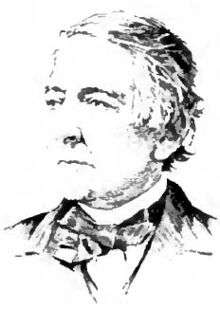William Burnet Kinney
William Burnet Kinney (September 4, 1799 – October 21, 1880)[1] was an American politician and diplomat.
William Burnet Kinney | |
|---|---|
 | |
| Signature | |
His grandfather, Sir Thomas Kinney, came to the United States from England before the Revolution to explore the mineral resources of New Jersey. Kinney was born and raised in the Speedwell section of Morristown, New Jersey, and lived there in later life.[2] William Burnet received a good education. After graduating from Princeton University, he studied law under Joseph C. Hornblower. In 1820, he began the life of an editor in Newark, New Jersey, where he founded the Advertiser in 1832. He continued to lead this life until his appointment, in 1851, as U. S. minister to Sardinia. Prior to this event, he had been conspicuous in various public capacities, and among them as a delegate, in 1844, to the Baltimore Whig convention, where he was largely instrumental in securing the nomination of his friend, Theodore Frelinghuysen, for the vice-presidency, with Henry Clay.
While minister at Turin he discussed with Count Cavour and other eminent men of the kingdom of Sardinia the movement for the unification of Italy. He rendered also, at the same time, important services to Great Britain, for which he received an acknowledgment in a special despatch from Lord Palmerston. When the U. S. government offered to transport Lajos Kossuth to the United States in a national ship, detached from the Mediterranean Squadron. Kinney made himself acquainted with the aims and purposes of the Hungarian exile, and gave prompt instructions to the commander, and information to his own government, of the objects of the fugitive. Daniel Webster, who was at that time United States Secretary of State, thwarted Kossuth's philanthropic but impracticable efforts to enlist the United States in a foreign complication.
On the expiration of his term of office, Kinney moved from Turin to Florence, where he devoted much of his time to researching the Medici family with a view to producing a historical work, but he did not live to accomplish it.
Personal life
Kinney married twice:
- In 1820, he married Mary Chandler. She died in 1841 at the age of 38.[3] They had two children:
- In 1841, he married Elizabeth Clementine Stedman, the author.[3] They had two children:
- Elizabeth Clementine Kinney who married William Ingraham Kip Jr. (1840-1902), the rector of Good Samaritan Missions in San Francisco and the son of Episcopal bishop and missionary to California, William Ingraham Kip. They had four children,[4] three of whom survived to adulthood: Elizabeth Clementine Kip (married Guy L. Eddie of the U.S. Army); Lawrence Kip; and Mary Burnet Kip (married to Dr. Ernest Franklin Robertson of Kansas City, KS).[3]
- Mary Burnet Kinney.[3]
His great-great-grandsons are businesspeople Frederick R. Koch, Charles Koch, David Koch, and Bill Koch.
Notes
- Finding aid for William B. Kinney Letters, 1867-1880
- Colles, Julia Keese. Authors and Writers Associated with Morristown:With a Chapter on Historic Morristown, p. 63. Vogt Bros., 1895. Accessed August 11, 2013. "Her husband, Mr. William Burnet Kinney. not only resided here in later years but was born at Speedwell, then a suburb of Morristown, and passed part of his early boyhood there To him we refer in the grouping of Editors and Orators. Mr. Kinney was a brilliant literary man about this home in Morristown unusual talent genius naturally grouped themselves."
- Genealogical and Memorial History of the State of New Jersey edited by Francis Bazley Lee
- A history of the new California: its resources and people, Volume 2 edited by Leigh Hadley Irvine
References
- Wilson, J. G.; Fiske, J., eds. (1892). . Appletons' Cyclopædia of American Biography. New York: D. Appleton.
- Gilman, D. C.; Peck, H. T.; Colby, F. M., eds. (1905). . New International Encyclopedia (1st ed.). New York: Dodd, Mead.